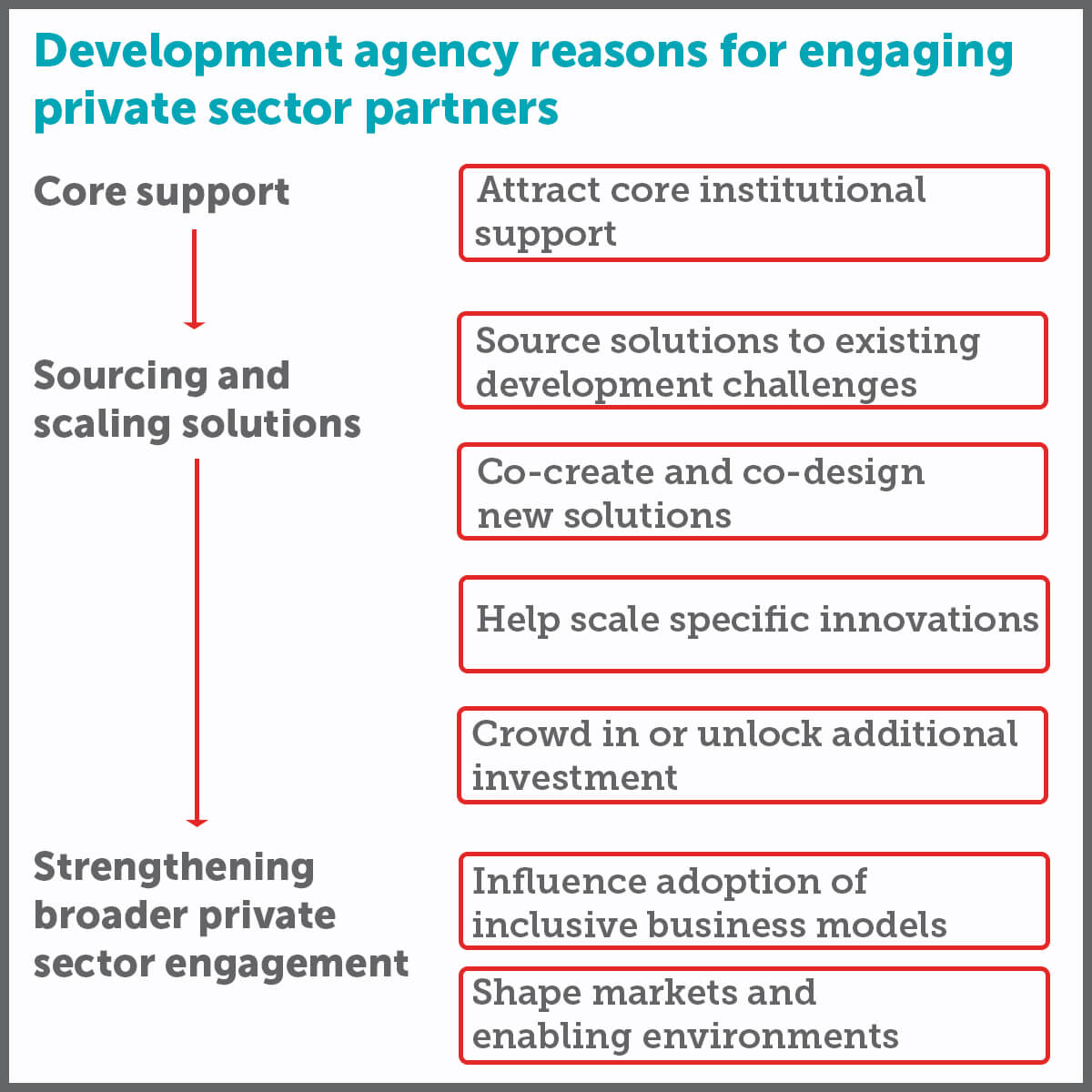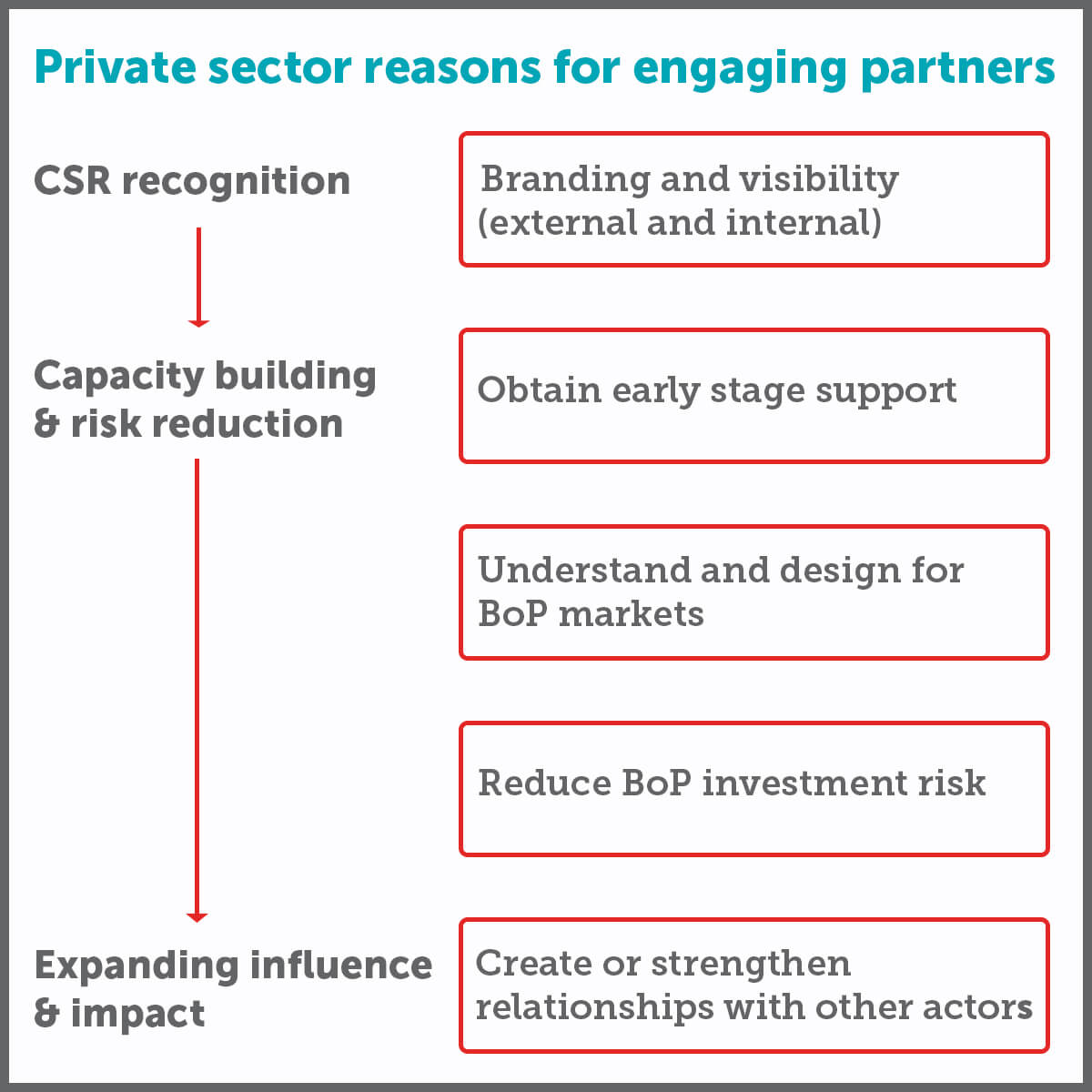Leveraging partnerships to build expertise, support around innovation
Part 3 of 4
Partnerships
[Editor’s Note: This is part of a series of blogs sharing insights from the results of a review conducted by Results for Development of the first three years of the innovationXchange (iXc) unit within the Australian Government Department of Foreign Affairs & Trade (DFAT). This blog explores the theme of partnerships, while others in this series look at the themes of: scaling innovation, the emerging concept of innovation ecosystems, and building a culture of innovation.]
Despite the persistently popular myths around the lone entrepreneur, it is now widely accepted that both the processes of innovation and scaling that innovation are impossible to do alone. As we discussed in the previous blog, it takes an ecosystem to scale an innovation — one that includes a wide range of partners working together to contribute different resources, at different times and in different ways.
So, when DFAT’s innovationXchange (iXc) was given the task of catalyzing and supporting innovation across the entire Australian aid program, its small, 12-person team knew they would need a lot of help to achieve the impact they wanted.
They also knew leveraging strong partnerships would be vital to success.
But when dealing with innovation, it’s rarely clear which particular partners you need to work with, or how that collaborative relationship should be designed and managed. The iXc prioritized external partnerships, particularly with private sector actors who had considerably longer experience in establishing and evolving innovation units to keep them competitive. They hoped these external partnerships would enhance the iXc team’s core expertise around innovation while also helping DFAT attract additional financing and support for the pipeline of early-stage innovators they were amassing within their portfolio.
At the same time, the iXc also looked within DFAT for internal partnerships to help promote innovation across the Department and enable other divisions to begin working in new, more efficient or impactful ways. This blog focuses specifically on the external partnerships that the iXc cultivated during its first three years — the impact of the internal collaboration efforts on changing the culture of innovation within DFAT are covered in another blog in this series.
Partnering with private actors: capital, expertise and thought leadership
Research suggests that the most effective partnerships are those built on a common goal and finding that all-important area of strategic complementarity that will increase the likelihood of all parties benefiting from the experience. However, funders and private sector partners may often have different motivation for engagement, or indeed different mechanisms, which can make it difficult to match needs and opportunities efficiently. From the perspective of development agencies, such as DFAT, the desire to engage with private sector actors can range from the straight-forward need to attract core institutional financing through to more complex shared objectives around shaping dynamic and sustainable markets for innovations among excluded populations (see Figure 1).
Figure 1.
Source: R4D, internal research conducted for the International Development Innovation Alliance, 2017.
On the other side, private sector actors are rapidly moving beyond more basic types of partnership driven by a corporate social responsibility agenda to a deeper form of collaboration exploring markets at the base of the pyramid (BoP), with the opportunity to learn and diversify their business networks (see Figure 2).
Figure 2.
Source: R4D, internal research conducted for the International Development Innovation Alliance, 2017.
iXc’s reasons for engaging external partners
For the iXc, a key objective in partnering with external actors (which were largely from the private sector but also included other governments, academic institutions and philanthropic organizations) was to go beyond transactional (typically financial) relationships and develop a deeper collaboration built on co-design, co-management and collective thought-leadership. R4D’s research for the International Development Innovation Alliance (IDIA) found that development agencies that are too prescriptive in terms of the need or solution they are seeking partnership for are actually a deterrent for many in the private sector, and reduce the potential for both parties to evolve their relationship around a common agenda.
This is not to say that both parties must start on an equitable footing. In fact, the iXc were very transparent from the start around the limitations of their knowledge and expertise, and this humility was appealing to some of their external partners. As one of their external partners reflected, “I hope the iXc felt they were able to start halfway around the track by standing on our shoulders and learning from our mistakes.” This transfer of knowledge and expertise was intentionally enabled by the iXc through episodic secondments for iXc staff within partner agencies, as was the case with USAID.
In return, partners such as CSIRO and the European Commission and private sector partners, such as GSMA and Intel Corp, seconded staff into the iXc to improve their development knowledge and in recognition of the ability of these innovation units to provide an umbrella entry-point into development agencies, which they view as “typically structured in a siloed way, so the people we approach are usually only interested in specific sectors. This can make it hard to get the right traction when you are talking about tech solutions, which cut across many areas.”
It is perhaps as a consequence of their shared desire for a deeper form of engagement that on average, external partners rated their relationship with the iXc as 4 out of 5 (with 1 being least successful to 5 being most successful). The typical iXc-partner engagement lasted around two years. Overall, the iXc was seen by external partners to be solutions-oriented, responsive and a strong thought partner, and iXc staff were typically enthusiastic about their objectives. They also noted that the iXc team was characterized by a good management style, ease of grant administration and a clear mandate from the Minister for Foreign Affairs.
One of the most tangible benefits from the iXc’s external partnerships over the first three years of operation was the successful leverage of significant additional funding which they were able to channel to early-stage innovators in their portfolio to complement their own support. The iXc reports leveraging nearly $60m in co-funding for the Asia-Pacific region, plus unquantifiable in-kind contributions of expertise and time (e.g., from Atlassian volunteer staff). (Co-funding figures must be caveated to consider the challenge of truly ‘leveraging’ additional funds.) Examples of funding leveraged that contributed to this total include Bloomberg, XPRIZE, and the Humanitarian, NGOs and Partnerships Division.
These partnerships with external actors were important in helping the iXc raise awareness of and build support for development challenges in the Asia-Pacific region that typically attract much less attention on the global stage than those in Africa. The iXc’s continued participation in the IDIA, of which it is a founding member, has also helped to shine the international spotlight on issues ripe for innovation in the Asia-Pacific region, while also providing a platform for other countries and regions to learn from, and possibly adapt and replicate, innovations from Asia-Pacific.
Building partnerships for the next three years
In 2018, DFAT launched a new Innovation Strategy in which partnership is recognized as a core value and behavior through the commitment to “connect with new people, organizations, technologies, science and businesses…partnering to ensure we achieve the maximum impact with others.” As it moves to refine and evolve its partnership objectives and modus operandi, the iXc will need to continue strengthening its approach, including:
- Aligning goals early on; clearly defining the scope/focus of the partnership in terms of development impact; and allocating dedicated resources (individuals, budget and time) to manage the relationships, which leads to greater effectiveness and is highly valued by private sector partners.
- Thinking creatively with partners on how to overcome challenges of geography and time zones; possibly through further secondments in strategic global locations.
- Ensuring that there are appropriate procurement mechanisms in place to enable collaboration with a range of actors, including smaller scale and/or non-traditional partners such as private sector entrepreneurs, acknowledging that they may need additional support around the operational dimensions of working with a government body (e.g., accountability requirements).
As a long-term learning partner of the iXc ourselves, we are excited to continue supporting the iXc team in 2019 to further support the achievement of its mission.
DISCLAIMER: This 4-part blog series is based on a report funded by the iXc. This is one activity under a broader strategic partnership between R4D and iXc. As a learning partner, R4D aimed to help the iXc reflect on their work and adapt their approach moving forward to achieve their intended impact. It was never intended, designed nor positioned as an evaluation. These findings and recommendations were intended for an iXc audience, but made public in the interest of full transparency — and in the spirit of supporting other innovation labs working on similar issues.















